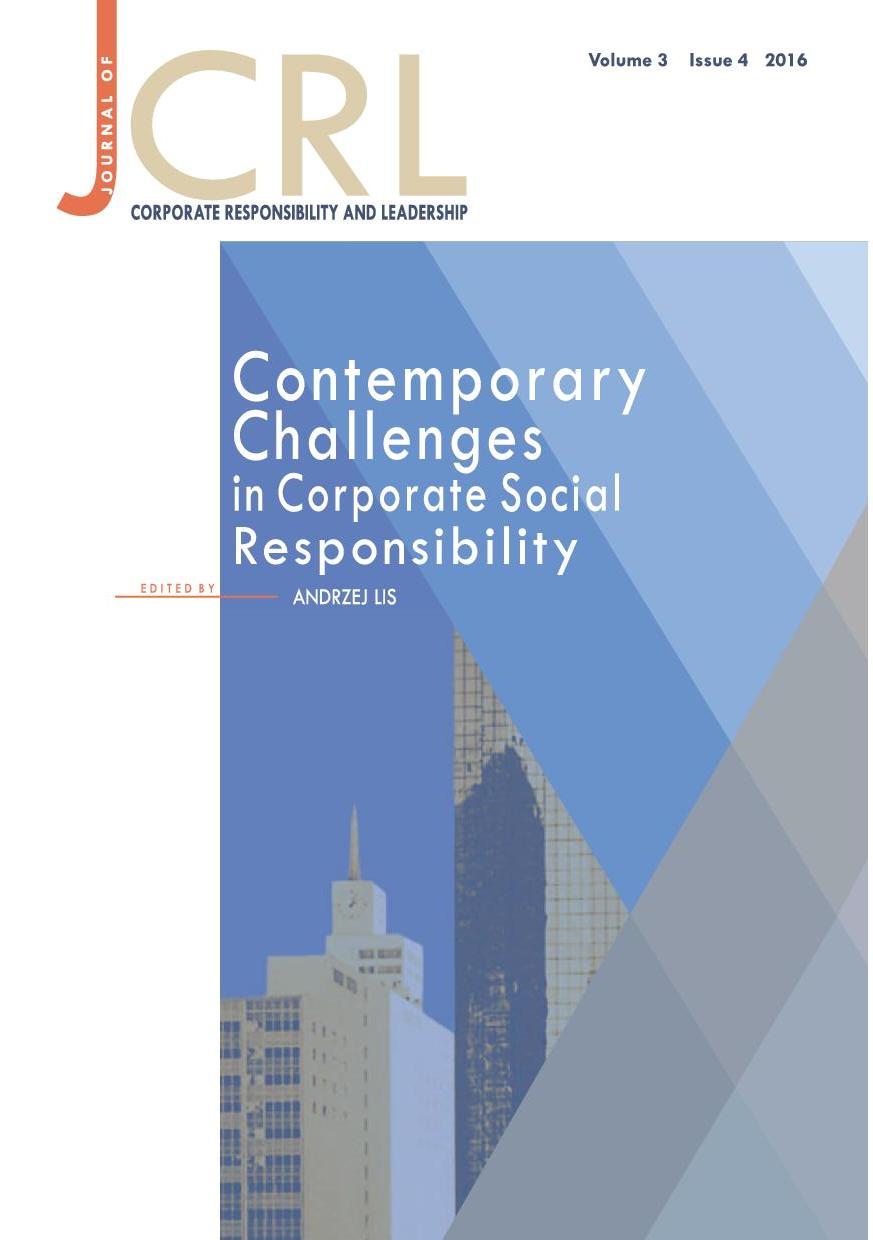Community Involvement in Pharmaceutical Companies in Poland
DOI:
https://doi.org/10.12775/JCRL.2016.022Keywords
corporate community involvement, pharmaceutical companiesAbstract
Aim: The aim of this article is to identify measures in the area of community involvement undertaken by pharmaceutical companies operating in Poland (listed in the I MS Health 2010 ranking of TOP 30 corporations in the pharmaceutical market). Moreover, methods for communicating these measures are also analysed.
Methodology: The study covered analysis of Polish-language websites of pharmaceutical companies listed in the TOP 30 ranking. I n the case of absence of data on community involvement on a given company website, additional online research with the use of subject terms and Google Search was employed.
Main findings: O f all the 30 companies subjected to the study, 4 companies did not have a section dedicated to corporate social responsibility on their websites, whereas 5 enterprises provided information on community involvement only on a company website in a language other than Polish. The dominant form of community involvement initiatives is financial support (predominantly in the form of donations). Companies also support local communities with aid in-kind and corporate volunteering. Communication of undertaken measures takes a form of the stakeholder information strategy – a company is interested in disseminating information on the actions taken without its stakeholders actively participating in the process.
Implications: Pharmaceutical companies operating in Poland should engage in activities targeted at local communities to a greater extent. Managers of pharmaceutical companies should be made aware of the benefits of using diverse forms of these measures, being at the same time encouraged to continuously expand initiatives already taken in this regard.
References
CSR Consulting (2011), “Indeks BI-NGO 2010”. Retrieved from http://odpowiedzialnybiznes.pl/public/files/BINGO_CSRConsulting_2010.pdf (accessed 10 June 2016).
DELab UW, PZPPF (2015), “Makroekonomiczne aspekty znaczenia sektora farmaceutycznego dla polskiej gospodarki”. Retrieved from http://www.delab.uw.edu.pl/wp-content/uploads/2015/11/DELab_Raport_Farmaceutyczny_1.pdf (accessed 17 March 2017).
Edelman (2016), “Edelman Trust Barometer 2016”. Retrieved from http://www.edelman.com/insights/intellectual-property/2016-edelman-trust-barometer/global-results/ (accessed 25 January 2017).
Foundation for Social Communication (2003), “Komunikowanie na rzecz CSR”. Retrieved from http://www.fks.org.pl/raporty/Raport-CSR.pdf (accessed 05 May 2016).
Gołaszewska-Kaczan, U. (2009), Zaangażowanie społeczne przedsiębiorstwa, Uniwersytet w Białymstoku, Białystok.
Griffin, R.W. (2001), Podstawy zarządzania organizacjami, PWN, Warszawa.
IE School of Communication (2010), “CSR Communication: Exploring European Cross-national Differences and Tendencies”. Retrieved from http://odpowiedzialnybiznes.pl/public/files/CSRCommunication_IE_School_of_communication_2010.pdf (accessed 15 June 2016).
Koneczna, R. (2014), CSR i jego narzędzia jako element strategii firm – praktyczny przewodnik, Wydawnictwo IGSMiE PAN, Kraków.
Kotler, P. (1998), “Konkurencyjność a charakter społeczny”, in: Hesselbein, F., Golgsmith, M., Beckhard, R. (Eds.), Organizacja przyszłości , Business Press, Warszawa.
Millward Brown SMG/KRC and PwC (2011), “Ocena stanu wdrażania standardów społecznej odpowiedzialności biznesu”. Retrieved from http://badania.parp.gov.pl/files/74/75/77/13079.pdf (accessed 20 January 2016).
Morsing, M., Schultz, M. (2006), “Corporate Social Responsibility Communication: Stakeholder Information, Response and Involvement Strategies”, Business Ethics: A European Review, Vol. 15, No. 4, pp. 326 – 328.
PwC (2011), “Wkład innowacyjnego przemysłu farmaceutycznego w rozwój polskiej Gospodarki”. Retrieved from http://www.pwc.pl/pl/publikacje/pwc_wklad_innowacyjnego_przemyslu_farmaceutycznego_w_rozwoj_polskiej_gospodarki.pdf (accessed 07 May 2016).
Research Institute on Market Economy (nd) “Znaczenie sektora farmaceutycznego dla polskiej gospodarki”. Retrieved from http://www.producencilekow.pl/images/raporty/Raport_IBNGR.pdf (accessed 20 January 2017).
Responsible Business Forum (2013), “Wspólna odpowiedzialność: Rola raportowania społecznego” Retrieved from http://odpowiedzialnybiznes.pl/public/files/Wspolna%20odpowiedzialnosc_Raportowanie%20spoleczne-POD GLAD.pdf (accessed 20 January 2017).
Rok, B. (2004), Odpowiedzialny biznes w nieodpowiedzialnym świecie, FOB, Warszawa.
Rudnicka, A. (2010), “Społeczne zaangażowanie przedsiębiorstw we współpracy z organizacjami pozarządowymi w Polsce”, in: Pisz, Z., Rojek-Nowosielska, M. (Eds.), Społeczna odpowiedzialność organizacji: Perspektywa badacza i wyzwania praktyczne, Wydawnictwo Uniwersytetu Ekonomicznego we Wrocławiu, Wrocław, pp. 110 – 122.
SGS Polska (2014), “Indeks BI-NGO 2014”. Retrieved from http://www.doradztwocsr.pl/pdf/ULOTKA_BI-NGO_2014.pdf (accessed 10 June 2016).
Sikorska, M. (2010), “CSR w Polsce. Forum UNDP. Zarządzanie zasobami ludzkimi”, in: Kochanowicz, J., Marody, M. (Eds.), Kultura i gospodarka, Wydawnictwo Naukowe Scholar, Warszawa.
Downloads
Published
How to Cite
Issue
Section
Stats
Number of views and downloads: 302
Number of citations: 0



